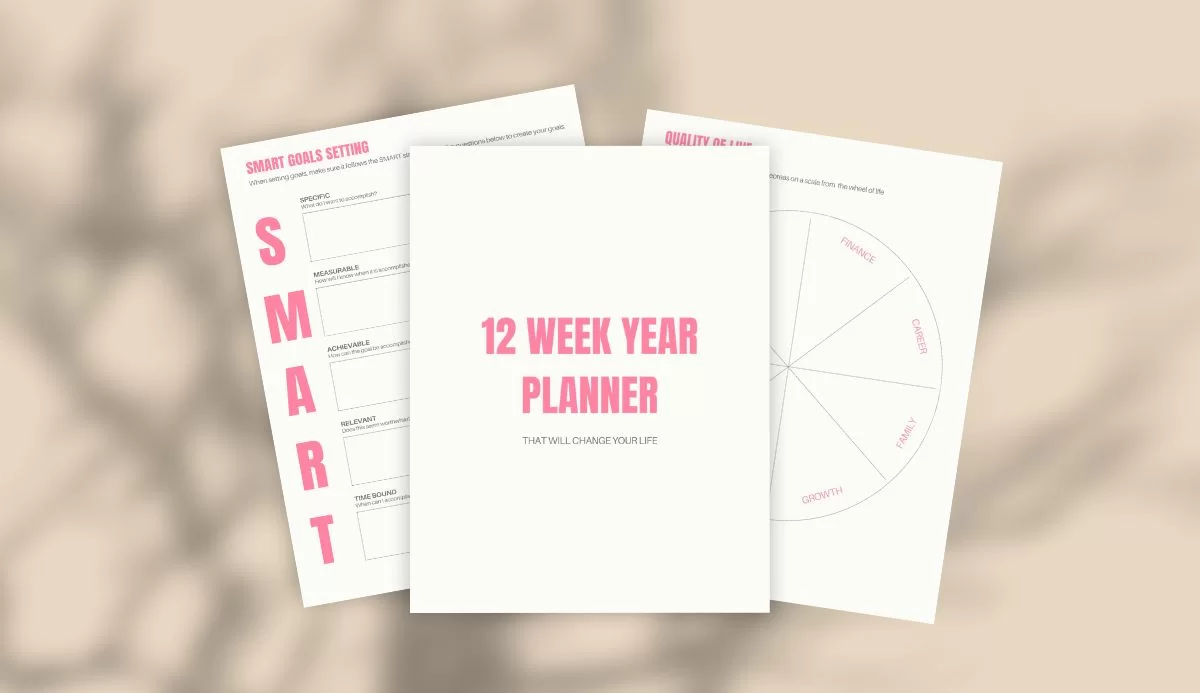
You’re 35, staring at your life, and nothing feels right anymore. The path you’ve been walking suddenly seems foreign, like you’ve been living someone else’s blueprint. I can tell you this moment isn’t a crisis—it’s clarity knocking at your door. Most people hit this wall and either panic or pretend it’s not happening. But you’re different because you’re here, ready to rebuild. The next thirteen steps will show you exactly how to turn this confusion into your greatest transformation.
Conduct a Life Audit to Assess Your Current Reality
When you hit 35, you can’t afford to drift through life without knowing exactly where you stand. I can tell you that most people skip this essential step, then wonder why they’re spinning their wheels. You need brutal honesty here, not sugar-coated delusions.
At 35, drifting without self-awareness is a luxury you can’t afford—brutal honesty beats comfortable delusions every time.
Start with your career. Are you climbing toward something meaningful, or just collecting paychecks? I’ve never seen anyone build real power without confronting this question directly.
Next, examine your finances, relationships, and health. Write down specific numbers, actual facts, not vague feelings.
Look at your daily habits too. Do they serve your ambitions or sabotage them? This audit reveals uncomfortable truths, but you can’t fix what you won’t acknowledge. Face reality first, then you’ll know exactly where to focus your energy.
Remember that habits are the things done regularly without much thought, so identifying patterns in how you spend your time will show you whether you’re building toward your goals or undermining them through consistent behaviors that don’t align with where you want to go.
Identify Your Core Values and Non-Negotiables

Your life audit probably revealed some uncomfortable patterns, but now comes the harder question: what principles will actually guide your decisions going forward? I can tell you that most people skip this step, then wonder why they keep making the same mistakes. Your core values aren’t just feel-good words on a wall—they’re your decision-making framework when life gets messy.
Start by identifying your non-negotiables. Maybe it’s never compromising your integrity for money, or always prioritizing family dinners. I’ve never seen someone build lasting success without clear boundaries. Write down five values that make you feel powerful when you honor them. These become your filter for every job offer, relationship, and major choice ahead.
Remember that prioritizing self-love isn’t selfish—it’s the foundation that enables you to show up authentically for others and honor the values you’ve just defined.
Explore What Energizes You Versus What Drains You
After you’ve locked in your core values, the next critical step involves mapping your personal energy patterns—and most people have never done this systematically.
I can tell you that understanding what fuels versus depletes you changes everything. Start tracking your energy levels hourly for two weeks. Notice when you feel sharp, motivated, alive—then identify what you were doing, who you were with, what environment surrounded you. I’ve never seen someone do this exercise without major revelations.
Maybe you discover that solving complex problems energizes you, but endless meetings drain you completely. Or perhaps creating something new fills your tank, while repetitive tasks leave you exhausted. This isn’t about preferences—it’s about recognizing your natural power sources. Once you map these patterns, you can intentionally structure your life around energy-giving activities.
Consider creating a morning sanctuary where you can begin each day by connecting with your energy patterns before external demands take over.
Define Success on Your Own Terms
Now that you understand your energy patterns, it’s time to tackle the hardest question most 35-year-olds face: what does success actually mean to you?
I can tell you that most people at thirty-five are still chasing someone else’s definition of winning. Maybe it’s your parents’ expectations, society’s benchmarks, or your college friends’ achievements on social media.
Here’s what I’ve learned: true power comes from defining your own scorecard.
Stop measuring yourself against external metrics that don’t align with your values. If family time matters more than corner offices, own it. If creative fulfillment trumps six-figure salaries, embrace it.
I’ve never seen anyone build lasting satisfaction by pursuing goals that weren’t authentically theirs. Write down what success looks like for you, not for anyone else.
Once you’ve defined your personal version of success, break down these larger aspirations into actionable steps that you can work on consistently each day.
Set Boundaries With External Expectations and Pressures

Defining success means nothing if you can’t protect that definition from the constant pressure to abandon it. I can tell you from experience, at 35, everyone’s got opinions about what you should be doing. Your parents want grandkids, your peers brag about promotions, society screams about homeownership milestones.
Boundaries aren’t walls, they’re filters. When your sister asks why you’re not married yet, you don’t owe her a dissertation. “I’m focusing on other priorities right now” works perfectly. When colleagues pressure you to chase their version of success, recollect your definition matters more than their approval.
The “Says Who?” method questions the source of each should thought, helping you distinguish between authentic desires and borrowed expectations from others.
I’ve never seen anyone regret protecting their authentic path, but I’ve watched countless people sacrifice their dreams for external validation.
Experiment With New Experiences and Perspectives
Three things happen when you stop experimenting at 35: your world shrinks, your confidence drops, and your brain literally starts forming fewer new connections. I can tell you from watching countless people hit this plateau – they become prisoners of their own routines.
Your power grows when you deliberately seek discomfort. Take that pottery class, learn Spanish, travel solo somewhere intimidating. I’ve never seen someone regret pushing their boundaries, but I’ve watched plenty regret playing it safe.
Start small but consistent. Try one new restaurant monthly, read books outside your usual genres, have conversations with people who think differently than you. Each experiment builds neural pathways that keep your mind sharp, adaptable. You’re not too old to reinvent yourself – you’re perfectly positioned to do it with wisdom.
The key is reframing stress as excitement, since your body creates identical physical responses to both – that elevated heart rate isn’t anxiety, it’s your system preparing for growth.
Build a Support Network of Growth-Minded People
While you’re busy experimenting with new experiences, you’ll discover something crucial – the people around you either fuel your growth or quietly sabotage it. I can tell you from experience, your circle at 35 determines your trajectory more than any self-help book ever will.
Start ruthlessly evaluating your current relationships. Does your friend constantly complain without taking action? Cut the cord. Does your colleague challenge your thinking, introduce fresh ideas? Keep them close.
Actively seek growth-minded people through professional networks, mastermind groups, or industry meetups. I’ve never seen someone transform their life while surrounded by comfort-zone dwellers. You need people who celebrate your wins, call out your excuses, and push you toward bigger goals. Remember that obstacles don’t stop you when you have the right people helping you figure out how to climb over, go through, or work around them. Your network becomes your net worth, literally and figuratively.
Develop a Learning Plan for Skills That Excite You
Once you’ve surrounded yourself with the right people, you’ll need something concrete to discuss with them beyond weekend plans and workplace gossip. That’s where your learning plan comes in. I can tell you from experience, at 35 you can’t afford to learn random skills just because they’re trendy. You need laser focus on what genuinely excites you and drives your ambitions forward.
Start by identifying three skills that make you feel energized when you think about mastering them. Maybe it’s public speaking, data analysis, or negotiation. Write them down, then create monthly milestones. I’ve never seen anyone build real competence without deadlines and measurable progress markers. Your growth-minded network will hold you accountable to these commitments.
Remember that most skills require realistic timeframes—expect 6-12 months of consistent practice to see meaningful progress in areas like public speaking or learning to code.
Create Small Wins to Build Momentum

Having a solid learning plan means nothing if you never execute it, and that’s where most people at 35 stumble. They create elaborate schemes but never take the first step. I can tell you that small wins are your secret weapon for building unstoppable momentum.
Start ridiculously small. If you want to learn coding, commit to writing one line of code daily. Want better fitness? Do five push-ups every morning. I’ve never seen someone fail when they start this small, because the barrier to entry becomes laughably low.
These tiny victories compound quickly. Within two weeks, you’ll naturally want to do more. Your brain craves that dopamine hit from completing tasks, and you’ll find yourself exceeding your minimum daily requirements. Small wins create the psychological momentum that transforms plans into powerful habits.
Consider implementing The Learning Loop by dedicating just five minutes daily to professional development, which creates compound growth over time and maintains the momentum you’ve built with your other micro-habits.
Practice Self-Compassion During the Transition
When you’re reshaping your life at 35, you’ll inevitably hit moments where nothing feels right, progress seems invisible, and you question every decision you’ve made. I can tell you from experience that beating yourself up during these moments destroys momentum faster than any external obstacle.
Self-compassion isn’t weakness—it’s strategic power management. You need your mental energy for execution, not self-destruction. I’ve never seen anyone achieve meaningful transformation while constantly criticizing themselves.
Here’s how you practice it effectively:
- Talk to yourself like you’d talk to your best friend facing the same struggle
- Acknowledge that confusion and setbacks are normal parts of major life changes
- Remind yourself that choosing growth at 35 takes courage, not everyone does it
Your inner dialogue determines your outer results. Remember that your inherent worth exists independently of external circumstances, whether you’re struggling through a transition or celebrating a breakthrough.
Establish Daily Habits That Support Your Vision
While self-compassion keeps your mental engine running, daily habits become the fuel that actually moves you toward your new life. I can tell you from experience, the difference between dreamers and achievers isn’t talent—it’s consistency in small actions.
Start with three non-negotiable habits that directly support your vision. If you’re building a business, dedicate thirty minutes daily to market research, networking, or skill development. If you’re changing careers, spend time each morning applying to positions or learning relevant skills.
I’ve never seen someone transform their life without morning rituals. Whether it’s journaling, reading industry news, or practicing new skills, these focused moments compound into massive change. Stack your habits—link them to existing routines like coffee or commuting. Make them so automatic that skipping feels wrong.
Design Quarterly Check-ins to Track Your Progress

Because daily habits create momentum, quarterly reviews guarantee you’re still heading in the right direction. I can tell you that three months passes faster than you think, and without checkpoints, you’ll drift off course.
Your quarterly review should include these critical elements:
- Honest assessment of goal progress – Rate each goal 1-10 and identify specific obstacles that blocked you
- Habit effectiveness evaluation – Which daily practices actually moved the needle versus those that felt productive but weren’t
- Course correction planning – Adjust goals that proved unrealistic or pivot when you’ve discovered better opportunities
I’ve never seen someone succeed long-term without regular reviews. You need these reality checks to stay accountable to yourself. Schedule these sessions like board meetings with your future self, because that’s exactly what they are.
Embrace the Journey Rather Than Rushing the Destination
At 35, you’re likely feeling the pressure to accelerate everything, but I can tell you that rushing toward your destination will actually slow you down. When you focus obsessively on the end goal, you miss the skills, connections, and insights that emerge during the process itself.
I’ve never seen someone build lasting success by skipping steps. The journey teaches you resilience when setbacks hit, patience when progress stalls, and adaptability when circumstances change. These aren’t nice-to-have qualities—they’re power tools that separate leaders from followers.
Instead of counting days until you arrive somewhere, start celebrating small wins along the way. Document what you’re learning, who you’re meeting, how you’re changing. This mindset shift transforms frustration into fuel, making you unstoppable rather than desperate.
Conclusion
You’re not lost—you’re at a crossroads, and that’s actually powerful. I can tell you from experience, clarity comes through action, not endless thinking. Start with one step today, whether it’s identifying your values or setting a single boundary. You’ve got the roadmap now, and at 35, you still have decades to build the life you want. Stop waiting for permission and start moving forward.





Leave a Reply